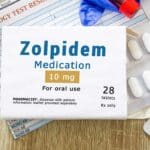Ambien and Ativan may be confused for one another because they treat similar conditions. However, these two prescription drugs differ in drug class, active ingredient, and drug interactions.
That being said, these drugs are similar in terms of drug schedule and the conditions they treat.
Differences Between Ativan & Ambien
Although these drugs share some similarities, differences include ingredients, drug type, contraindications, and half-life.
Active Ingredient
One of the major differences between Ativan and Ambien is their active ingredient.
Lorazepam is the generic name for Ativan, which is also its active ingredient.
Ambien is the brand name for zolpidem, the active ingredient.
Drug Class
Ativan and Ambien are also in two different drug classes. Ativan is considered a benzodiazepine. This drug class also includes medication like alprazolam (Xanax), temazepam (Restoril), diazepam (Valium), and clonazepam (Klonopin)
Ambien is a sedative-hypnotic medication like eszopiclone (Lunesta).
But despite being in different drug classes, both drugs work on similar parts of the brain.
Ambien works by activating the neurotransmitter GABA in the brain. This slows down the central nervous system (CNS) and helps with the treatment of insomnia. Ativan increases the availability of GABA, which has a calming effect on the CNS and eases symptoms of anxiety.
Drug Interactions
The drugs that negatively interact with Ambien and Ativan also differ. While they have a few similarities, most of the drugs that interact with Ambien do not interact with Ativan.
Some of the drugs that adversely interact with Ambien include:
- antidepressants
- opioid painkillers
- medications for anxiety
- colds or allergy medication
- anticonvulsants
- sedatives
- sleeping pills/sleep aids
- tranquilizers
Some of the drugs that negatively interact with Ativan include:
- antihistamines
- antidepressants
- opioid painkillers
- asthma medicine
- over-the-counter cold and allergy medicine
- muscle relaxants
- oral contraceptives
- sedatives
- sleeping pills/sleep aids
- theophylline
- tranquilizers
- valproic acid
If you are on any of the drugs above, make sure to let a healthcare professional know before they prescribe Ativan or Ambien.
Medical Conditions
Ativan and Ambien can also worsen certain medical conditions, but which health issues they negatively affect differs.
Ativan should not be taken if you have one of the following medical conditions:
- glaucoma
- seizures
- lung disease
- heart disease
- liver disease
Ambien also has a number of medical conditions that it shouldn’t be taken with, including:
- history of substance use disorder
- history of depression or suicidal thoughts/behaviors
- sleep apnea
- asthma
- lung disease
- kidney disease
- liver disease
- bronchitis
- emphysema
- myasthenia gravis
Half-Life
Ativan and Ambien also have very different half-lives. A half-life is the time it takes for half a dose of a drug to exit the body.
Ativan’s half-life is approximately 10-20 hours while Ambien’s is about 2-3 hours. Ambien will leave your system much quicker than Ativan.
Similarities Between Ativan & Ambien
Despite so many differences, Ativan and Ambien do have a few things in common including what they are used for and their drug control status.
Drug Schedule
One of the biggest similarities between Ativan and Ambien is their controlled substance schedule. Both drugs are classified as Schedule IV controlled substances by the Drug Enforcement Administration (DEA) and the Food and Drug Administration (FDA).
This means they both have a low risk for abuse but can still be habit-forming and lead to physical dependence and addiction.
Approved Uses
Ambien and Ativan are both used in the short-term treatment of anxiety disorders and sleep disorders like insomnia.
However, Ativan is primarily prescribed for anxiety while Ambien is primarily prescribed for insomnia.
Ativan can also be prescribed for seizures.
Side Effects
Ativan and Ambien also come with very similar side effects including:
- drowsiness
- next-day sleepiness
- dizziness
- dry mouth
- diarrhea
- nausea
- changes in appetite
- headache
- constipation
Ambien use may also lead to stomach pain, sleepwalking, cognitive impairment, and memory loss. Ativan can cause restlessness, blurred vision, and weakness.
If you abuse or take higher doses of Ambien or Ativan over a long period of time, you may become dependent on these drugs. Withdrawal symptoms, such as high blood pressure and sleep problems, may occur when you stop use.
Both drugs can also lead to serious side effects but those aren’t as common as the ones listed above. If you experience any side effects from either of these drugs, make sure you tell your healthcare provider.
Get Substance Abuse Treatment
If you or a loved one is struggling with substance abuse, please contact us today for information on our outpatient treatment options.
Sources
Written by
Northeast Addition Editorial Team
©2024 Northeast Addition Center | All Rights Reserved
This page does not provide medical advice.





